Chapped lips are often linked to cold and dry climates, and rightly so, as these weather conditions frequently lead to dry and peeling lips. However, it’s important to realize that there are other factors that can cause your lips to become chapped.
In our latest blog post, we delve into dry lips by vitamin deficiencies as well as other main factors and how to treat them effectively.

1. Understanding Dry Lips
Dry lips pose more significant risks than mere discomfort and a dip in confidence:
1.1 Symptoms of Dry Lips
Dry lips, also referred to as chapped lips or cheilitis, are a common condition that manifests with a range of uncomfortable symptoms. This condition occurs when the lips lose their natural moisture, resulting in the following:
- Dryness: The lips become rough and parched due to the lack of moisture.
- Flakiness: Dry lips often develop flaky or peeling skin, which can be both unsightly and uncomfortable.
- Cracking: In severe cases, the lips may crack, leading to painful fissures.
- Redness: The affected area may become red or irritated.
- Swelling: Swelling or puffiness can occur, especially when the lips are repeatedly licked or exposed to harsh weather conditions.
- Bleeding: In extreme cases, dry lips can lead to bleeding, as the delicate skin becomes more vulnerable.
- Pain or discomfort: Dry lips can be painful, causing sensations of discomfort, burning, or itching.
1.2 Impact of Dry Lips on Overall Health and Well-being
While dry lips may appear as a minor cosmetic concern, they can exert a significant influence on your overall health and well-being. Consider the following ways in which dry lips can affect you:
- Discomfort: Dry lips can be not only uncomfortable but also distracting, making it challenging to concentrate on your daily tasks.
- Impaired Speech and Eating: Severe dryness and cracking of the lips can hinder your ability to speak and eat comfortably.
- Reduced Confidence: The presence of chapped lips can lower self-confidence, potentially affecting social interactions and self-esteem.
- Risk of Infection: Cracked and open skin on the lips can serve as entry points for bacteria and viruses, heightening the risk of infections.
- Dental Health: Persistent dry lips may lead to lip-licking, which can contribute to dental problems over time.
- Underlying Health Issues: In some instances, chronic dry lips may be indicative of underlying health concerns, such as vitamin deficiencies, allergies, or certain medical conditions.
- Quality of Life: On the whole, the discomfort and inconvenience associated with dry lips can have a detrimental impact on your overall quality of life.
2. What Vitamin Deficiency Causes Dry Lips?
Nutritional deficiencies, particularly in vitamins and minerals, can significantly affect your health, including the condition of your lips. When your body lacks certain nutrients, it may manifest in various ways, one of which can be chapped lips.
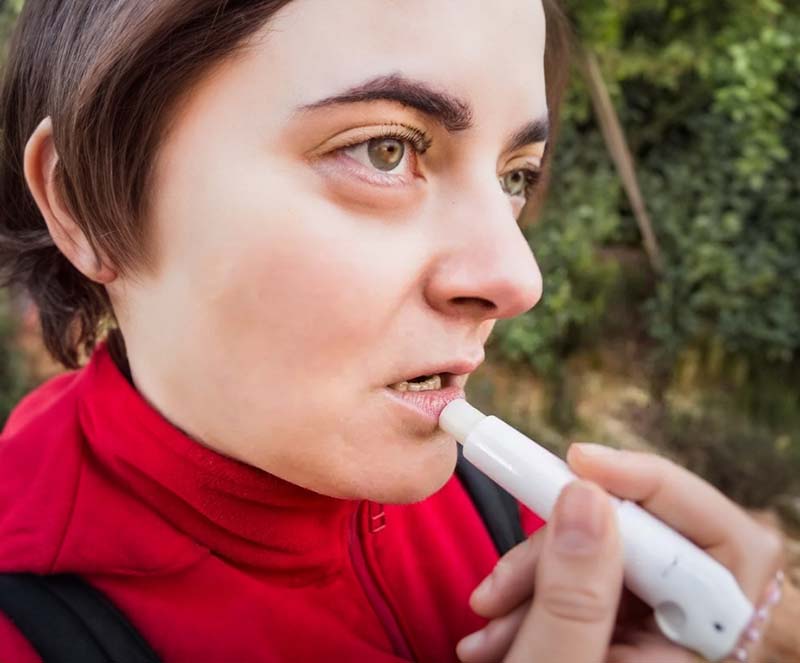
2.1 Iron Deficiency
Iron plays a key role in overall health, including the well-being of your lips. This essential mineral is crucial for transporting oxygen in the blood and for energy production within the body. A lack of iron can lead to anemia, a condition marked by a decreased number of red blood cells or hemoglobin. This can result in symptoms like fatigue, weakness, shortness of breath, and dizziness. Alarmingly, around 42% of young children and 40% of pregnant women globally suffer from anemia.
2.2 Zinc
Zinc is another important nutrient, involved in a range of cellular activities, including DNA synthesis and protein production. Its role in lip health is particularly noteworthy, as it helps maintain moisture and is crucial for a strong immune system. A deficiency in zinc can manifest as dry lips, cracked mouth corners, and a heightened susceptibility to infections.
2.3 Vitamin B
The Vitamin B complex, essential for numerous bodily functions like energy production, nerve function, and red blood cell formation, also has a direct link to lip health. Deficiencies, especially in Vitamin B12, can lead to anemia, fatigue, and weakness. These vitamins are vital for producing red blood cells and ensuring the proper functioning of the nervous system, which in turn keeps your lips healthy and prevents them from becoming chapped.
3. Other Factors Causing Dry Lips
Chapped lips can be caused by various factors, some of which may surprise you. Here’s a comprehensive look at the most common causes:
3.1 High Salt and Spice Intake
Frequent consumption of salty snacks like chips or pretzels can lead to peeling lips. The salt on these foods can draw moisture away from your lips, causing dryness. Similarly, spicy foods can also irritate the skin and lead to water loss.
3.2 Lip Licking
Constantly licking your lips is detrimental. Saliva contains enzymes that break down fats and proteins, the same components that your lips are made of, leading to dryness.
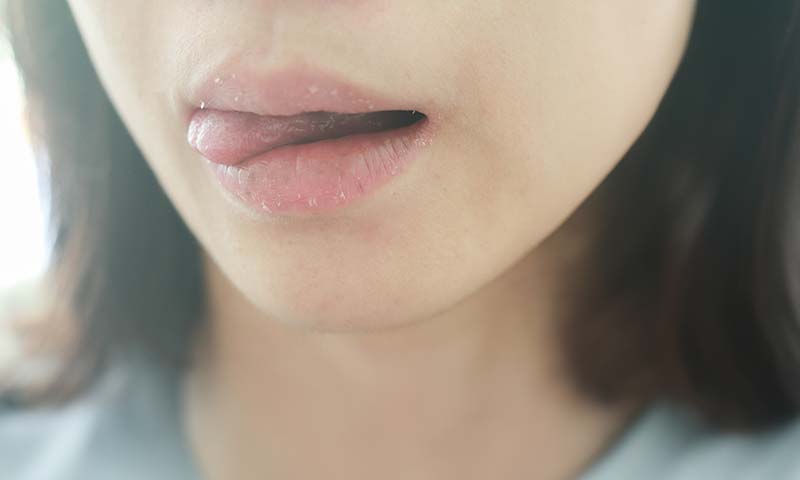
3.3 Sun Exposure
Unprotected exposure to the sun can dry out the skin, including your lips. Sunburn can cause inflammation, leading to peeling as the skin cells turnover.
3.4 Dehydration
Dehydration can cause dry lips due to the rapid turnover of skin cells in this area. This is particularly common in dry indoor environments.
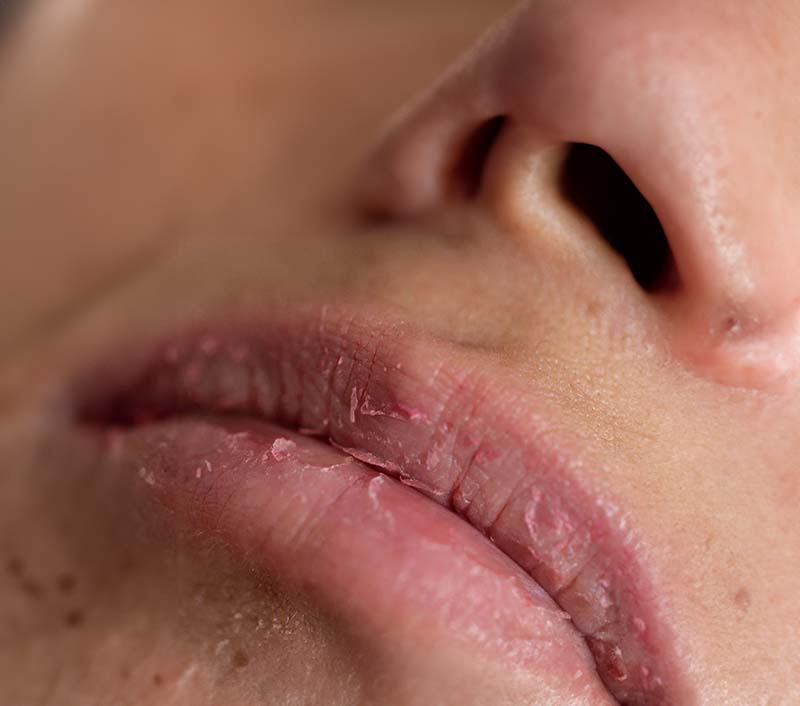
3.5 Dry Air Exposure
Living in low humidity conditions or experiencing seasonal moisture drops can result in chapped lips.
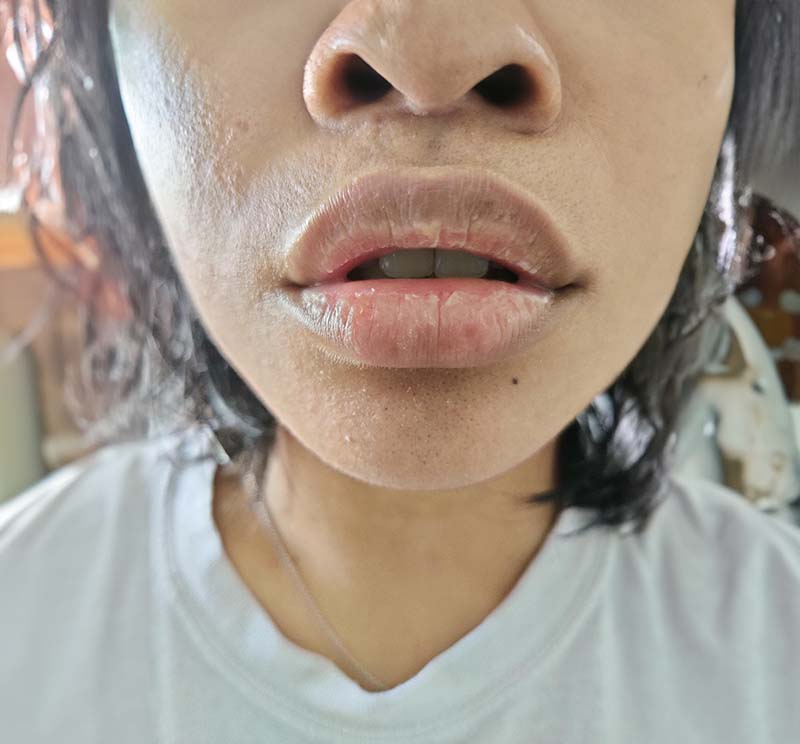
3.6 Medication Side Effects
Certain medications, such as acne treatments (e.g., Accutane), chemotherapy drugs, common skincare ingredients (benzoyl peroxide, retinol, salicylic acid), antidepressants, antihistamines, antibiotics, and some over-the-counter pain medications, can cause dry, peeling lips.
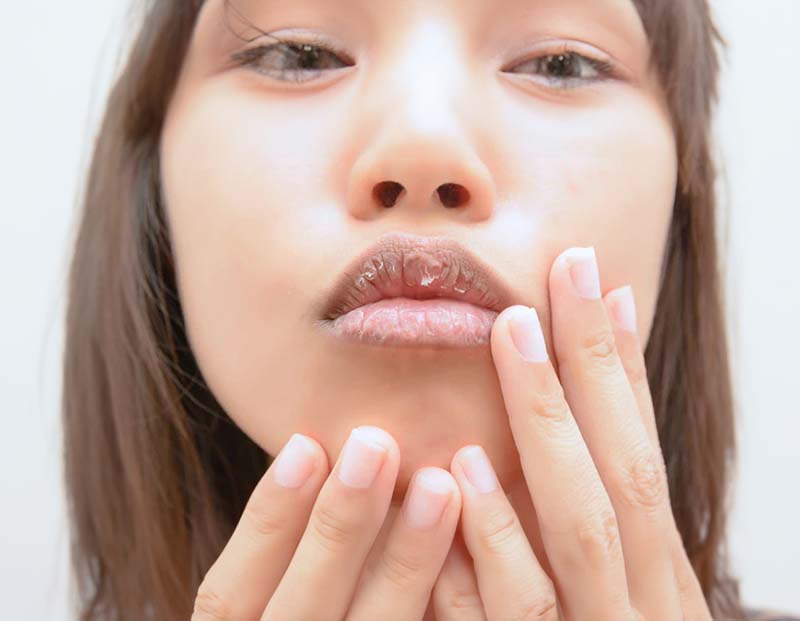
3.7 Yeast Overgrowth
Yeast infections around the mouth can lead to dry, flaky skin and sometimes fissuring (small cracks) around the mouth.
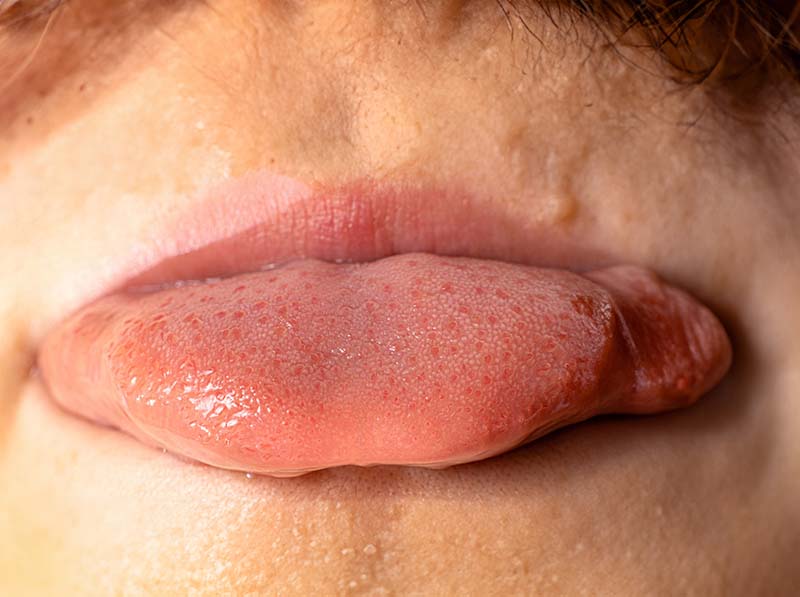
3.8 Actinic Cheilitis
This condition, more common in older individuals, results from chronic sun damage preventing the skin from repairing itself, leading to dryness and scaly patches, especially on the lower lip.
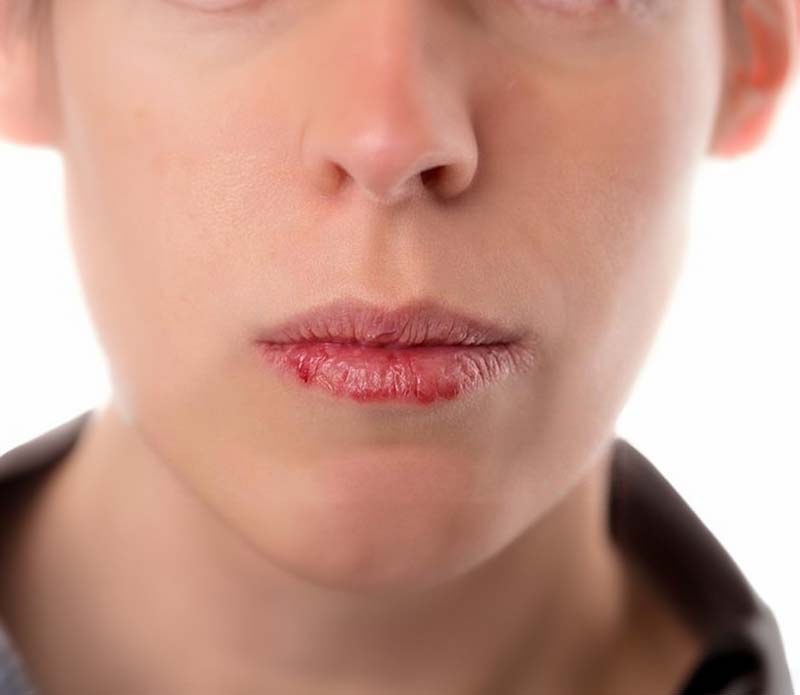
3.9 Allergic Reactions or Irritant Contact Dermatitis
Allergic reactions can cause peeling, redness, swelling, and itchiness, potentially triggered by ingredients in makeup, skincare, or toothpaste. Irritant contact dermatitis, on the other hand, can be caused by friction from metal dental implants.
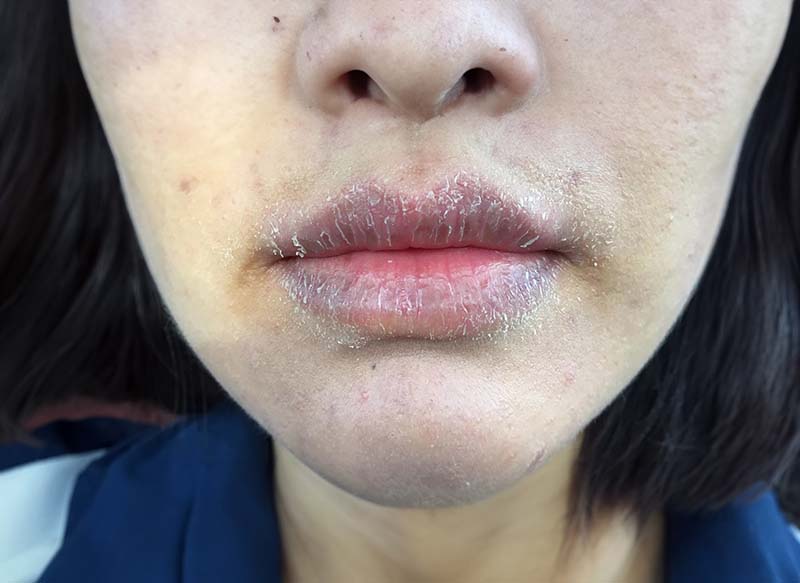
3.10 Lichen Planus
This inflammatory skin condition can manifest as itchy, purple bumps on the body and also affect the lips, appearing as purple or brownish cracked areas.
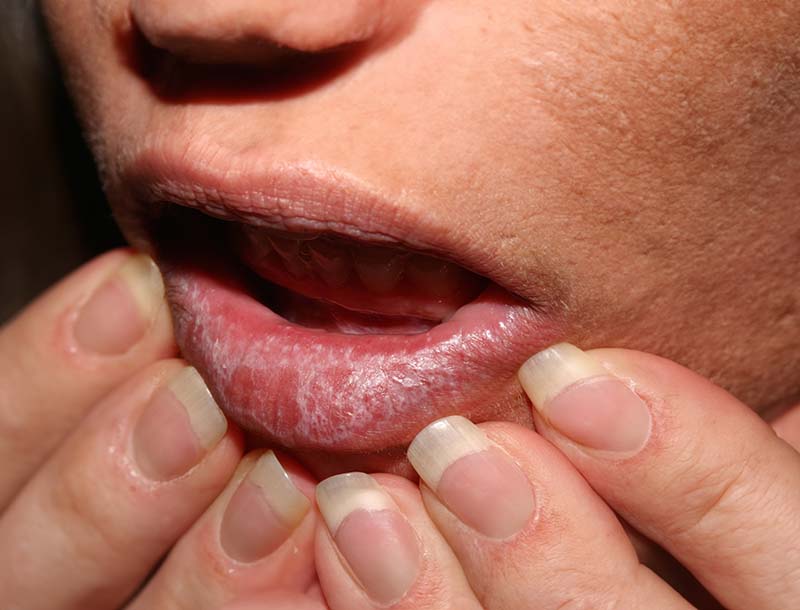
3.11 Paraneoplastic Pemphigus
A rare condition associated with underlying cancer, characterized by erosive oral disease. It can cause cracked, bleeding lips with sores, redness, and swelling.
4. Solutions and Treatment Methods for Dry Lips
Dry lips can be both uncomfortable and unsightly, yet there are multiple effective solutions and treatments available to address this issue. Here’s an expert guide based on scientific research:
- Treat Vitamin Deficiencies: To counteract vitamin deficiencies, consider incorporating foods rich in iron, zinc, and Vitamin B into your diet. Foods like leafy greens, nuts, seeds, meat, and dairy are great sources. Supplements can also be used, but it’s advisable to consult with a healthcare provider before starting any supplement regimen. Additionally, regular blood tests can help monitor your nutrient levels and ensure your body is getting what it needs for optimal health.
- Stay Hydrated: Regular water intake is essential for maintaining overall hydration, including the moisture in your lips.
- Use a Humidifier: In dry environments, using a humidifier can add necessary moisture to the air, helping to prevent lip dryness.
- Choose Lip Products Wisely: Opt for lip balms free from potential irritants like fragrances, dyes, or alcohol, as these can further dry out the lips.
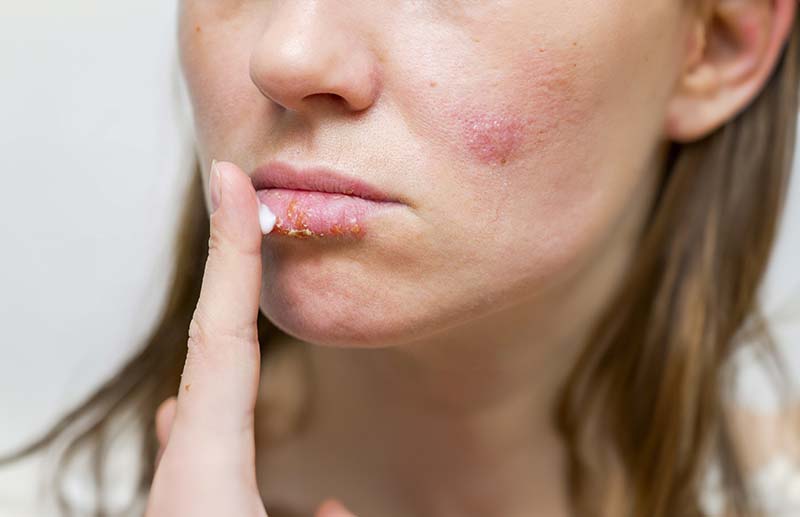
- Limit Exposure: Exposure to extreme temperatures, wind, and sun can cause chapped lips. Protect them with a moisturizing lip cream or balm that includes sunscreen.
- Avoid Lip Licking: Licking your lips leads to more dryness as saliva evaporates rapidly. Try to keep this habit in check.
- Exfoliate Your Lips: Regularly exfoliating your lips with a homemade scrub (using sugar, salt, honey, and oil) can remove dead skin cells and stimulate the growth of new, healthy skin.
- Use Moisturizing Ointments: For severely dry and cracked lips, a thick ointment like white petroleum jelly can be more effective. It locks in moisture better than waxes or oils. Apply frequently throughout the day and before bedtime.
- Hyaluronic Acid for Lips: This powerful ingredient, known for its moisture-retaining properties, isn’t just for facial skin. Apply your favorite hyaluronic acid serum to your lips for added hydration.
- Avoid Metal Items: Everyday metal items like paperclips or jewelry can irritate your lips. It’s best to avoid contact.
- Address Nutritional Deficiencies: If you suspect your diet may be contributing to dry lips, consult a healthcare provider for appropriate guidance.
- Seek Professional Help: If your dry lips persist despite these tips for two to three weeks, it might be time to consult a dermatologist.
Note: For added lip care, consider applying lip balm before brushing your teeth. This can create a barrier against potentially irritating ingredients found in toothpaste. Also, for a natural lip moisturizer, coconut oil is a great option. It’s easily absorbed and nourishing for the skin.
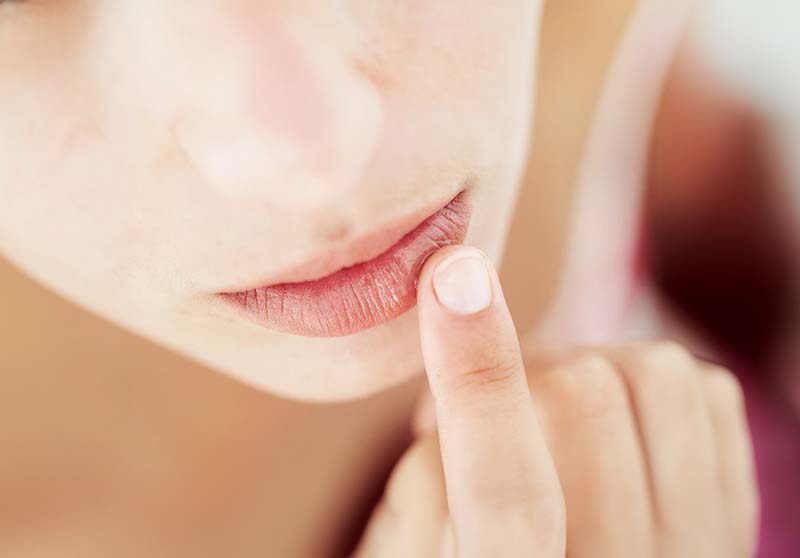
5. Conclusion
Considering the important connection between dry lips and vitamin deficiencies, it’s clear that a holistic approach is necessary for keeping your lips healthy and hydrated. This article has emphasized the importance of not only addressing potential nutrient deficiencies but also making lifestyle changes and adopting proper lip care practices.
We value your experiences and insights, and we’d love to hear from you. Have you ever faced dry lip issues related to vitamin deficiencies? What strategies have you found effective in dealing with this problem? Please share your stories and feedback with us.
To discover more informative and engaging content, don’t forget to explore our other articles on Biosculpture. Each post aims to enhance your knowledge of health and wellness, guiding you toward a more balanced and vibrant life.


